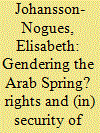| Srl | Item |
| 1 |
ID:
124775


|
|
|
|
|
| Publication |
2013.
|
| Summary/Abstract |
During the anti-regime uprisings in Tunisia, Egypt and Libya, women from all walks of life were as ready as men to take to the streets to protest against the ineptitude and transgressions of their countries' governments. Their courage was particularly noteworthy given that they suffered not only the violence of the regimes' attempts to suppress protests by force, as did their male counterparts, but also a systematic targeting by security forces who attempted to break the women's spirits through attacks on their honour and bodily integrity. The female presence and agency in the Arab Spring encouraged activists in Tunisia, Egypt and Libya to expect an equitable role for women in the political transition processes that followed the fall of the authoritarian regimes in those countries. However, the female input in those political transitions has been scant. Moreover, in all three countries, established women's rights are increasingly under attack and violence against women is on the rise. This article applies a gendered perspective to explore the upheavals of the Arab Spring and the political transitions in the three countries, and inquires into the insecurities that women have suffered since early 2011.
|
|
|
|
|
|
|
|
|
|
|
|
|
|
|
|
| 2 |
ID:
085669


|
|
|
|
|
| Publication |
2008.
|
| Summary/Abstract |
The NRF and the EU BG were launched to enable NATO and the EU respectively to shed some of their Cold War roles and begin to incorporate new organisational functions as means to meet their members' needs in a changing global security environment. However, since their launch the two rapid reaction forces have both failed to fully consolidate. Our argument is that an examination of intra-NATO/EU contested identities at three levels (supra-state, state and sub-state) provides us with additional insights for the lack of success in consolidating the two sets of rapid reaction forces.
|
|
|
|
|
|
|
|
|
|
|
|
|
|
|
|